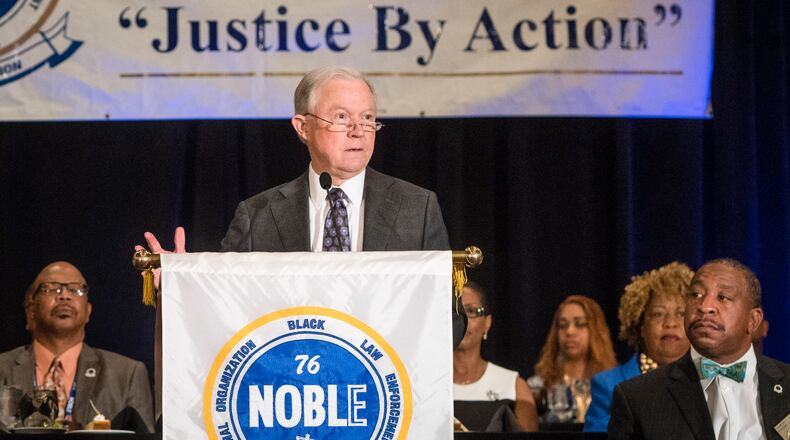Last week Attorney General Jeff Sessions was under fire from President Donald Trump for not having his back.
On Tuesday in Atlanta, Sessions was quick to defend recent comments by the president at a rally in Suffolk County, New York that many thought encouraged police brutality. While he didn’t address the controversy during his remarks to the National Organization of Black Law Enforcement Executives, Sessions privately assured leaders of the group that Trump was only joking.
Former DeKalb County Public Safety Director Cedric Alexander, a past president of NOBLE, said Sessions’ explanation was insufficient.
“This was a chance to alleviate concerns about strained relations between communities and police and it was not addressed,” said Alexander, now deputy mayor of Rochester, New York.
“You just can’t say he’s joking and that’s the end of it,” he said.
Trump, flanked by Long Island-area police officers, most of whom cheered his remarks, had said, “Like when you guys put somebody in the car, and you’re protecting their head, you know, the way you put your hand over” their head … I said, ‘You can take the hand away, O.K.?’ ” He told officers, “Please don’t be too nice.”
Sessions mentioned Trump only in passing, saying the administration’s top priority was reducing rising crime rates in many American cities.
“The president can be very direct,” said Sessions, who Trump recently criticized in a series of Twitter broadsides in which he referred to the former Alabama senator as “weak” and “beleaguered.” Trump also said he would’ve chosen a different attorney general had he known Sessions would recuse himself from the investigation into Russian interference in the 2016 election.
But that was last week. On Monday, the White House said the president has “100 percent confidence in all members of his cabinet,” including Sessions.
Sessions — who emphasizes a return to get-tough policies that many conservative critics say were undercut by the Obama Administration — is popular with law enforcement groups who appreciate his traditional approach. But his confirmation was opposed by many civil rights organizations critical of his track record on issues important to minorities.
He spoke briefly Tuesday about dealing with rogue officers, vowing to “hold any officer responsible who violates the law.
“You know that all it takes is for one bad officer to destroy the reputations of so many … who serve with honor and distinction,” he said.
Sessions also made mention of a poll in which only 30 percent of African-Americans surveyed expressed confidence in police.
“In last three years that number dropped by five points,” Sessions said. “This is a trend we must reverse.”
But he didn’t offer any possible solutions, said Alexander, a member of President Barack Obama’s Task Force on 21st Century Policing, convened to identify best practices while offering recommendations on how police can effectively fight crime reduction without eroding public trust.
That trust will not be rebuilt by emphasizing solely “law and order,” Alexander said.
“They use that language very loosely and I’m afraid they fail to realize the historical context,” he said, noting that the phrase has often been used by politicians seeking to curry resentment and exploit racial fears.
“There’s still more conversation that needs to take place to make sure we have a Justice Department that emphasizes fair and equitable treatment for everyone,” Alexander said.
Echoing many of the president’s campaign themes, Sessions said, “Violent crime is making a comeback across America. We’re seeing a significant increase (in crime) after 30 years on the decline. The murder rate surged nearly 15 percent from 2015 to 2016, the largest increase since 1968.”
Violence against law enforcement is also on the rise, he said. Police, he said, are “in harm’s way more than ever and often get the blame you don’t deserve.”
“We don’t need to tell police not to do their jobs,” Sessions said.
“We have your back,” he later added.
Atlanta Police Chief Erika Shields, speaking after the attorney general, noted that homicides were down 29 percent in Atlanta from this time a year ago.
Reducing crime can’t be accomplished without a holistic approach, she said.
“As law enforcement we’re destined for failure if we choose to stand in judgment of those who need our help the most,” Shields said. “Business as usual cannot be how things are done.”
Know what’s really going on with crime and public safety in your metro Atlanta community, including breaking news, trial coverage, trends and the latest on unsolved cases. Sign up for the AJC’s crime and safety newsletter delivered weekly to your inbox.
About the Author
Keep Reading
The Latest
Featured


